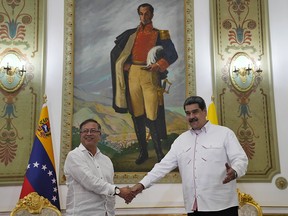World
Colombian President Proposes Union with Venezuela Amid U.S. Tensions

Colombian President Gustavo Petro has put forth a provocative proposal to unite Colombia and Venezuela as a strategic response to the increasing military presence of the United States in the Caribbean. The suggestion revives the concept of Gran Colombia, a republic that existed from 1821 to 1831, encompassing present-day Colombia, Venezuela, Ecuador, and Panama. While analysts have largely dismissed the feasibility of this idea, it highlights the deteriorating relations between Bogotá and Washington, which have historically been allies.
In a recent speech, Petro criticized U.S. President Donald Trump for a range of actions impacting South America, from imposing tariffs to launching military operations against alleged drug trafficking vessels, resulting in over 70 fatalities since September. “America is not a continent of kings or princesses, princes or despots,” Petro declared, referencing Trump and his military interventions. He called for a renewed focus on Gran Colombia, likening the current struggle against U.S. aggression to the revolutionary efforts of independence leader Simon Bolívar.
The day following his speech, Petro reiterated his vision on social media, proposing that the nations defined in the 1819 territorial boundaries work towards reconstructing Gran Colombia. This rhetoric aligns with Petro’s leftist ideology, which often invokes Bolívar as a symbol of unity and resistance against imperialism.
Mixed Reactions and Political Implications
Despite Petro’s enthusiasm, his proposal has received skepticism from political insiders. Armando Benedetti, Colombia’s Interior Minister and a close ally of Petro, described the idea as largely symbolic. “It is very difficult to imagine that five or six countries… with so-called solid democracies, will somehow come together to form a single country,” he noted in an interview with the National Post.
Political analyst Sergio Guzmán, director of Colombia Risk Analysis, echoed these sentiments, characterizing the proposal as a long-standing ambition of Petro that remains impractical. “This has been part of Petro’s imaginary and pipe dreams for decades,” Guzmán stated. He emphasized that while the notion of Gran Colombia resonates with Petro’s political identity, its realization is unlikely.
Petro’s call for unity is particularly notable given the significant decline in U.S.-Colombia relations since Trump took office in January. Tensions escalated sharply in September when the U.S. government initiated airstrikes against boats in the Caribbean, leading to Colombia’s decertification as a key partner in the war on drugs. Following these developments, Petro had his U.S. visa revoked during a visit to New York, where he publicly urged American troops to disobey orders regarding military actions in Gaza.
The situation further deteriorated in October when Petro accused Trump of “murder” related to a strike that he claimed killed an innocent Colombian fisherman. In a retaliatory move, Trump labeled Petro an “illegal drug dealer” and included him on the Clinton List of sanctioned individuals, freezing the assets of Petro, his family, and key advisors.
Future of Colombia-Venezuela Relations
As relations between the two nations continue to unravel, Guzmán suggested that the current dynamics leave little room for improvement. “I don’t think it can get any worse… and I don’t think it’s gonna get any better,” he remarked. The proposal for a union with Venezuela may reflect not only Petro’s political aspirations but also a broader sentiment of resistance against perceived U.S. imperialism in the region.
The evolving situation underscores the complexities of international relations in Latin America, where historical grievances and contemporary challenges intersect. As Petro pushes for a renewed Gran Colombia, the response from both regional neighbors and global powers will likely shape the future political landscape of South America.
-

 Science3 months ago
Science3 months agoToyoake City Proposes Daily Two-Hour Smartphone Use Limit
-

 Top Stories3 months ago
Top Stories3 months agoPedestrian Fatally Injured in Esquimalt Collision on August 14
-

 Health3 months ago
Health3 months agoB.C. Review Reveals Urgent Need for Rare-Disease Drug Reforms
-

 Technology3 months ago
Technology3 months agoDark Adventure Game “Bye Sweet Carole” Set for October Release
-

 World3 months ago
World3 months agoJimmy Lai’s Defense Challenges Charges Under National Security Law
-

 Lifestyle3 months ago
Lifestyle3 months agoVictoria’s Pop-Up Shop Shines Light on B.C.’s Wolf Cull
-

 Technology3 months ago
Technology3 months agoKonami Revives Iconic Metal Gear Solid Delta Ahead of Release
-

 Technology3 months ago
Technology3 months agoApple Expands Self-Service Repair Program to Canada
-

 Technology3 months ago
Technology3 months agoSnapmaker U1 Color 3D Printer Redefines Speed and Sustainability
-

 Technology3 months ago
Technology3 months agoAION Folding Knife: Redefining EDC Design with Premium Materials
-

 Business3 months ago
Business3 months agoGordon Murray Automotive Unveils S1 LM and Le Mans GTR at Monterey
-

 Technology3 months ago
Technology3 months agoSolve Today’s Wordle Challenge: Hints and Answer for August 19









